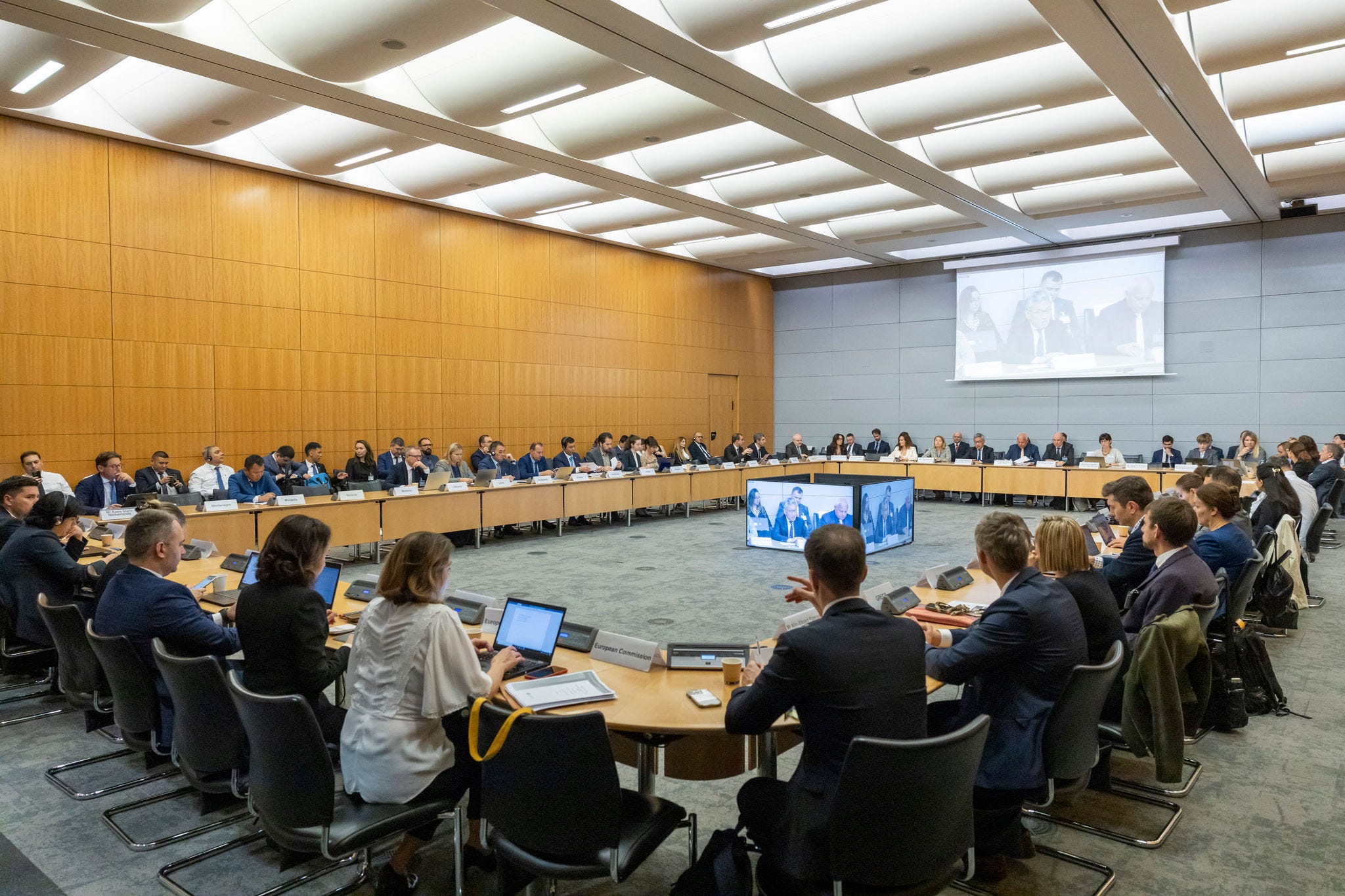The Istanbul Anti-corruption Action Plan (IAP) is the sub-regional peer-review programme for the Anti-Corruption Network for Eastern Europe and Central Asia (ACN). Launched in 2003, it supports anti-corruption reforms through country reviews and by monitoring the implementation of recommendations, promoting international standards and good practice in tackling corruption.
Istanbul Anti-Corruption Action Plan: Country monitoring
The Istanbul Anti-Corruption Action Plan is the flagship peer-review programme for the Anti-Corruption Network for Eastern Europe and Central Asia.
About
Participating countries
|
|
|
|
|
|
|
|
|
|
Note:
In a letter dated 16 February 2023, Georgia informed the OECD about its decision not to join the IAP's fifth round of monitoring. The ACN Steering Group discussed the matter at its 28th meeting on 4 October 2023 in the absence of representatives of the Government of Georgia. The Group stressed that Georgia is welcome to rejoin the Istanbul Anti-Corruption Action Plan monitoring programme, should the country decide to. The European Commission included this call to Georgia in its enlargement report, as a step to be completed in 2024.
The IAP's fifth round of country monitoring
The ACN revamped the methodology used for the IAP’s fifth monitoring round, combining qualitative and quantitative indicators for better measurement and promotion of progress. This marked a major change from previous rounds under the IAP, where a country was measured against its own earlier performance. The indicators have clear, uniform and tailored benchmarks, set after extensive consultation, and form the basis for standardised, consistent and transparent assessment with more engagement from stakeholders. This allows for comparison between countries and increases incentives to implement reforms covering nine performance areas.
The fifth round of monitoring was launched with a pilot, which was part of the EU for Integrity Action for the Eastern Partnership project. The pilot completed in spring 2022 with monitoring reports for Armenia, Azerbaijan, Georgia, Moldova and Ukraine. ACN's Steering Group adopted the revised methodological documents for the assessment framework and guide in November 2022. A manual for monitoring experts is available and provides guidance on the monitoring process.
Previous monitoring rounds
First round: 2003-7
Progress and challenges
Second round: 2008-12
Progress and challenges | Russian version
Third round: 2013-15
Progress and challenges | Russian version
Fourth round: 2016-19
Progress and challenges | Russian version
Fifth round of monitoring reports
-
The report assesses Kazakhstan’s anti-corruption reforms against a set of indicators and benchmarks under nine performance areas that focus on anti-corruption policy, prevention of corruption and enforcement of criminal liability for corruption offences. The report analyses Kazakhstan’s efforts to amend its laws and build anti-corruption institutions to prevent and address corruption, and its measures to detect, investigate and prosecute corruption cases identifying areas for improvement and follow up.Learn more
-
The report assesses Kyrgyzstan’s anti-corruption reforms against a set of indicators and benchmarks under nine performance areas that focus on anti-corruption policy, prevention of corruption and enforcement of criminal liability for corruption offences. The report analyses Kyrgyzstan’s efforts to amend its laws and build anti-corruption institutions to prevent and address corruption, and its measures to detect, investigate and prosecute corruption cases identifying areas for improvement and follow up.Learn more
-
The report assesses Tajikistan’s anti-corruption reforms against a set of indicators and benchmarks under nine performance areas that focus on anti-corruption policy, prevention of corruption and enforcement of criminal liability for corruption offences. The report analyses Tajikistan’s efforts to amend its laws and build anti-corruption institutions to prevent and address corruption, and its measures to detect, investigate and prosecute corruption cases identifying areas for improvement and follow up.Learn more
-
The report assesses Ukraine’s anti-corruption reforms against a set of indicators, benchmarks and their elements under five performance areas that focus on anti-corruption policy, prevention of corruption and enforcement. It analyses Ukraine’s efforts to amend laws, build anti-corruption institutions, its measures to detect, investigate and prosecute corruption cases and identifies areas for improvement.Learn more
-
The report analyses Moldova's efforts to build anti-corruption institutions, its measures to detect, investigate and prosecute corruption cases and identifies areas for improvement.Learn more
-
The report analyses Azerbaijan's efforts to build anti-corruption institutions, its measures to detect, investigate and prosecute corruption cases and identifies areas for improvement.Learn more
-
The report analyses Armenia’s efforts to build anti-corruption institutions, its measures to detect, investigate and prosecute corruption cases and identifies areas for improvement.Learn more
-
This pilot report analyses Georgia’s anti-corruption framework and practices based on the criteria to test the new methodology for the 5th round of monitoring under the Istanbul Anti-Corruption Action Plan. The report examines Georgia’s National Anti-Corruption Strategy, reforms of the judiciary and public prosecution system and public trust in the independence and integrity of these institutions. For each area of analysis, the report identifies areas for improvement and provides recommendations.Learn more
-
This pilot monitoring report assesses Moldova’s anti-corruption framework and practices based on the criteria to test the new methodology for the 5th round of monitoring under the Istanbul Anti-Corruption Action Plan. The report analyses Moldova’s anti-corruption policy, including the development of an evidence-based anti-corruption strategy, adoption of legislative provisions and establishment of dedicated bodies responsible for the enforcement of these provisions. For each area of analysis, the report identifies areas for improvement and provides recommendations.Learn more
-
This pilot report, elaborated before Russia’s large-scale aggression against Ukraine, examines Ukraine’s anti-corruption framework and practices based on the criteria to test the new methodology for the 5th round of monitoring under the Istanbul Anti-Corruption Action Plan. The report analyses Ukraine’s anti-corruption institutions, investigation and prosecution of corruption offences and the overall enforcement framework. For each area of analysis, the report identifies areas for improvement and provides recommendations.Learn more
-
This pilot report assesses Azerbaijan’s anti-corruption framework and practices based on the criteria to test the new methodology for the 5th round of monitoring under the Istanbul Anti-Corruption Action Plan. The report examines Azerbaijan's anti-corruption policy documents, the investigation and prosecution of corruption offences and the overall enforcement framework. The report also identifies areas for improvement and provides recommendations.Learn more
-
This pilot monitoring report assesses Armenia's anti-corruption reforms and practices based on the criteria to test the new methodology for the 5th round of monitoring under the Istanbul Anti-Corruption Action Plan. The report analyses Armenia’s steps in building anti-corruption institutions and Armenia’s measures to detect, investigate and prosecute high-profile corruption cases. The report also identifies areas for improvement and provides recommendations.Learn more
Related publications
-
 20 November 2024
20 November 2024 -
 20 November 2024
20 November 2024 -
 19 November 2024
19 November 2024 -
 19 November 2024
19 November 2024 -
 18 November 2024
18 November 2024 -
 1 January 2020
1 January 2020 -
 1 January 2016
1 January 2016 -
 1 January 2015
1 January 2015 -
 1 January 2013
1 January 2013

















